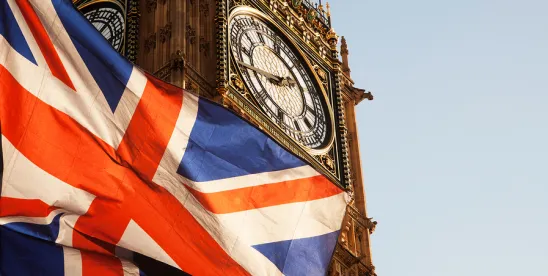In April 2017, the UK Joint Committee on Human Rights suggested that it might be appropriate for a “failure to prevent” mechanism, such as the one found in section 7 of the Bribery Act 2010, to be applied to business and human rights. Earlier this year, the British Institute of International and Comparative Law (“BIICL”) published the results of a study that considered the feasibility of introducing such a mechanism in the UK, with reference to the UN Guiding Principles on Business and Human Rights (UNGPs).
A Recap on “Failing to Prevent Bribery”
Under section 7, a relevant commercial organisation is guilty of an offence if a person associated with it bribes a third party with the intention of obtaining or retaining business or a business advantage for the relevant commercial organisation. “Relevant commercial organisation” is defined widely and would include any UK company or partnership, plus any foreign company or partnership carrying on a business, or part of a business, in the UK. Under section 8, a person is “associated with” a relevant commercial organisation if that person performs services for or on behalf of the organisation and potential examples of associated persons are employees, agents and subsidiaries of the organisation. It is a defence, however, for the organisation to demonstrate that it had “adequate procedures” in place designed to prevent its associated persons from bribing. Pursuant to section 9, the UK Government has published guidance as to what may constitute “adequate procedures”. The guidance focuses on six key principles:
-
The commercial organisation having clear, practical, accessible, effectively implemented and enforced procedures which are proportionate to the bribery risk it faces and the nature, scale and complexity of its activities;
-
Top-level management of the organisation being committed to preventing bribery by associated persons;
-
A periodic, informed and documented assessment being carried out by the organisation of the nature and extent of the internal and external risks posed by bribery on its behalf by an associated person;
-
Proportionate and risk-based due diligence by the organisation of its actual or prospective associated persons;
-
Effective and proportionate internal and external communication by the organisation (including training) of its anti-bribery policies and procedures; and
-
Monitoring and review by the organisation of its anti-bribery procedures, with improvements implemented by the organisation where necessary.
It is a criminal offence to breach this duty for which the maximum penalty is an unlimited fine.
Context and Background
In the last ten years, the UK has enacted several innovative pieces of legislation to promote ethical behaviour in business. The Bribery Act has introduced one of the strictest anti-bribery and corruption regimes in the world. The Criminal Finances Act 2017 introduced the offence of failing to prevent the facilitation of UK tax evasion offences. The Modern Slavery Act 2015 requires large undertakings to publish an annual statement setting out what steps they have taken to ensure that slavery and human trafficking is not taking place in any of their supply chains or any part of their business.
In addition, recent case law suggests judges are more willing to accept that UK parent companies may have a case to answer in the UK courts for the acts or omissions of their foreign subsidiaries. For example, in Lungowe v Vedanta, the Supreme Court upheld the Court of Appeal’s decision to allow 1,826 Zambian villagers to bring claims against a UK-headquartered PLC in respect of personal injury and property damage allegedly caused by its Zambian subsidiary in relation to mining activity in Zambia in the English courts. It is anticipated that, in 2020, the Supreme Court will also hear an appeal in the case of Okpabi v Royal Dutch Shell, in which a group of Nigerian citizens is seeking permission to bring claims in the English courts against another UK-headquartered PLC in respect of pollution and environmental damage allegedly caused by its Nigerian subsidiary.
These legislative and case law developments may be evidence of a greater willingness to hold companies to account for the actions or omissions of their subsidiaries, agents, representatives, etc. From a survey of businesses conducted as part of BIICL’s study, the clear majority of respondents considered that existing law did not provide business with sufficient legal certainty about which processes are required to avoid human rights abuses. An even greater majority considered that additional regulation on corporate human rights obligations may provide benefits for business.
Elements of a Proposed Mechanism to Prevent Human Rights Harms
BIICL recommended that a mechanism to prevent human rights harms should cover the following:
-
The duty would apply to all internationally-recognised human rights, and would cover environmental harms.
-
The duty would apply to all UK companies and partnerships or companies and partnerships carrying on a business, or part of a business, in the UK, regardless of size or sector. However, guidance should make clear that human rights due diligence procedures should be proportionate to the size of a company and that SMEs may have less formal processes and management structures than larger companies.
-
The duty would be on an organisation to prevent human rights harms in its own activities and those of its business relationships, but there would be a statutory defence where the organisation had procedures that were “reasonable in all of the circumstances” (see below).
-
A failure to prevent harms would result in potential civil liability for damages to those persons affected, unless the defendant could avail itself of a due diligence defence. Although breach of the duty would not constitute a criminal offence per se, it would be without prejudice to any criminal liability that would otherwise arise.
-
Whether an organisation has breached its duty to prevent human rights harms would depend on the circumstances of each case. However, any accompanying guidance should elaborate on the concept of ‘leverage’ with reference to the wording in the UNGPs (which talks about the extent to which an organisation can influence another organisation or a particular situation).
-
There would be a defence where the organisation had procedures that were “reasonable in all the circumstances” or had carried out “reasonable” due diligence to prevent human rights harms. Accompanying guidance would need to elaborate on the scope of this defence, with reference to the UNGPs (which state that what is “reasonable” will depend on the size of a business, the risk it faces and the nature and context of its operations).
-
The duty to prevent would extend to harms that take place throughout the entire value chain (as opposed to the pure supply chain) of a company, regardless of the jurisdiction in which the harms take place, in accordance with the UNGPs.
-
Apart from entitling those affected to bring a civil action for compensation for damages suffered, the mechanism should also provide for preventative and injunction orders, and state-based oversight.
The study includes a model legal provision which incorporates the recommendations above and compares it to section 7 of the Bribery Act.
Potential Next Steps
BIICL’s proposals tie in with the current focus on companies to demonstrate their environmental, social and governance (“ESG”) credentials to investors, shareholders, employees and customers. Rather than facing opposition, their survey suggests that most businesses would actually welcome further regulation if it would provide certainty for them as to what they must do to comply with human rights law. Of course, the survey was conducted and study was published before the current coronavirus pandemic. Currently, there are no formal proposals by the Government to implement BIICL’s recommendations as law. In any event, would businesses still be willing to accept additional regulation when they are already fighting to survive and potentially face a long, slow recovery?




 />i
/>i
